822 reads
43 Stories To Learn About Object Oriented
by
May 25th, 2023
Audio Presented by

Lets geek out. The HackerNoon library is now ranked by reading time created. Start learning by what others read most.
About Author
Lets geek out. The HackerNoon library is now ranked by reading time created. Start learning by what others read most.
